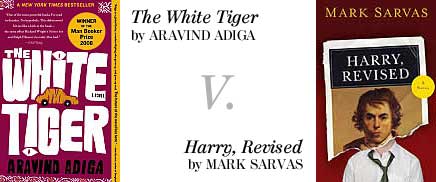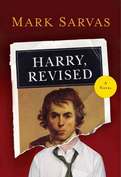
- This is Round 1, Match 3 of the SUSAN SONTAG REGIONAL
- March 11, 2009
- Next Match
- Previous Match
The Tournament of Books is an annual battle royale between 16 of the best novels published in the previous year.
A new match is played here each weekday in March.
All titles 30% off at Powells.com
The Rooster on Facebook, and on Twitter
Previous years: 2008, 2007, 2006, 2005
Contact the Tournament staff:
[email protected]

judged by Jonah Lehrer
Harry, Revised had me at the first line: “Harry Rent used to fiddle with his wedding ring, now he fiddles with the space it has left behind.” I enjoyed that sentence not just because I’m also an inveterate fiddler, twisting my wedding ring until my skin turns red, but because it immediately launches us into the endearingly digressive mind of Mr. Rent. He’s a ne’er-do-well who always means well, a bumbling nebbish with a heart of gold (and a weakness for prostitutes). As the title promises, the plot hinges on Harry’s attempts to revise himself, and to amend for the flaws that led, however indirectly, to the death of his wife. Despite a few too many allusions to Dumas—Harry models himself on the Count of Monte Cristo—Sarvas does an admirable job of fleshing out a 19th-century narrative skeleton with some pitch-perfect descriptions of 21st-century Los Angeles and its denizens, from the Brentwood podiatrist to the diner waitress.
Both of these novels are pleasurable reads, but I found myself (much to my surprise) more interested in Harry Rent’s sandwich habits—he doesn’t like the Monte Cristo, even though he orders it every time—than in the perpetual “Darkness” of the Indian street described by Balram. The reason is that Harry’s inner monologue feels sincere, the endearingly authentic output of a confused mind, whereas Balram’s letters are so (over)loaded with cutting social observations that he eventually turns himself into a symbol. To be sure, he’s an evocative symbol, a potent stand-in for the hypocrisy of the Indian middle class and their shiny new shopping malls, but still a symbol. In contrast, the incoherencies and imperfections of Harry feel all too human.
Today’s WINNER
Harry, Revised by Mark Sarvas

About the Judge
From the Booth
| I actually really enjoyed The White Tiger—it made me laugh out loud many times and its satire is extremely bold. | Kevin | John | Mark’s book is engaging, but I was bothered by the very element Judge Lehrer praises in his write-up. |
» Read Kevin Guilfoile & John Warner’s commentary on the match and leave a comment of your own «
The Standings
View the Brackets [PDF]
• Finals •
City of Refuge3 v. A Mercy1
judged by all judges + Amanda Hesser
• Round 1 •
26661 v. Steer Toward Rock4
judged by Brockman
Netherland2 v. A Partisan’s Daughter3
judged by Kate Schlegel
The White Tiger1 v. Harry, Revised4
judged by Jonah Lehrer
Unaccustomed Earth2 v. City of Refuge3
judged by Mary Roach
Shadow Country1 v. The Disreputable History of Frankie Landau-Banks4
judged by Anthony Doerr
The Lazarus Project2 v. The Northern Clemency3
judged by Monica Ali
A Mercy1 v. The Dart League King4
judged by Jonathan Eig
Home2 v. My Revolutions3
judged by Witold Riedel
• Round 2 •
26661 v. A Partisan’s Daughter3
judged by Maud Newton
Harry, Revised4 v. City of Refuge3
judged by David Rees
Shadow Country1 v. The Lazarus Project2
judged by C. Max Magee
A Mercy1 v. My Revolutions3
judged by John Hodgman
• Semifinals •
26661 v. City of Refuge3
judged by Liz Entman
Shadow Country1 v. A Mercy1
judged by Junot Díaz
• Zombie Round •
City of Refuge3 v. The Disreputable History of Frankie Landau-Banks4
judged by Rosecrans Baldwin

